
In photos: 2015 in review
Despite several pushbacks, the world still saw important progress in press freedom levels in 2015. From free election coverage in Myanmar to the establishment of the first women’s magazine in Iraqi-Kurdistan, we bring you some of the highlights of the work of our partners in 2015
Myanmar’s elections in November marked a significant step forward for the country, with media covering, for the first time ever, the country’s elections freely.
Following the elections, media, government and civil society met in Yangon to discuss developments in the media.
“We are now beginning the second phase of media reforms with new players in the political landscape. That is why this conference is important,” said U Thiha Saw, Secretary of Myanmar News Press Council & Executive Director of Myanmar Journalism Institute.
The Minister for Information stressed that media reforms should continue under the new government.
The Economist named Myanmar “Country of the Year” as its transition to something resembling democracy has come faster than expected.
New Iraqi-Kurdish women’s magazine breaks with tradition
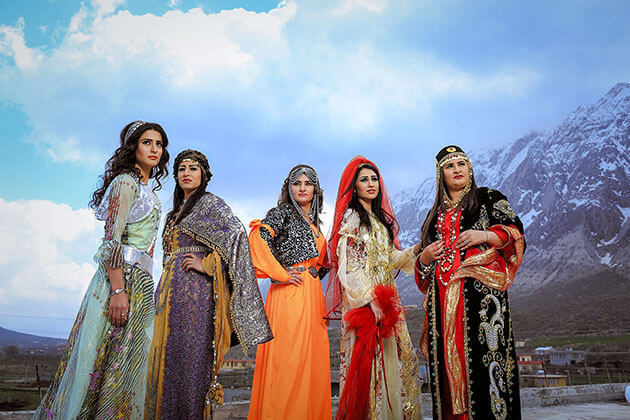
Iraqi Kurdistan’s first mainstream magazine for women, Zhin, with an online version in Arabic titled Iraqiyat, was a highlight in an otherwise difficult year for the area’s media. The magazine employs an all-female staff, producing courageous stories ranging from the latest trends in fashion to women fighters who battle Islamic State.
“People are tired of only hearing about the miserable parts of women’s lives. They want to read about those who succeed,” said Ala Lattif, editor of Zhin.
The International Women’s Day was marked by the magazine with a photo shoot of five female refugees, highlighting how they are women, students, workers and sisters first — refugees second.
New Algerian TV station gains immense popularity
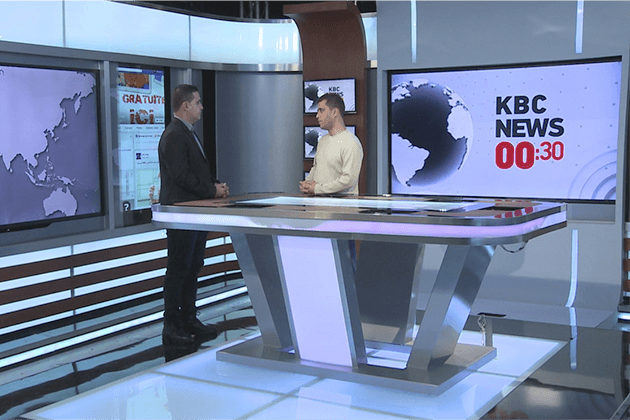
February 2015: Training session in the new studio. Setting up an independent TV channel in a country where the state used to dominate broadcasting completely is no easy feat. In April, Khabar Broadcasting Corporation (KBC), to which IMS has provided critical expert advice, celebrated its first anniversary with Algerians across the country watching what quickly became one of the country’s most popular TV channels.
One special guest at the TV channel was the famous Algerian cartoonist, Ali Dilem, who was sentenced to jail a few years ago for cartoons depicting the Algerian president and who has received several fatwas condemning him to death.
“I usually talk through my cartoons, because they express what I have in my heart. I am very touched that you gave me the opportunity to express myself on TV,” he said after appearing on the channel.
Women stand up to challenge male dominance in the media
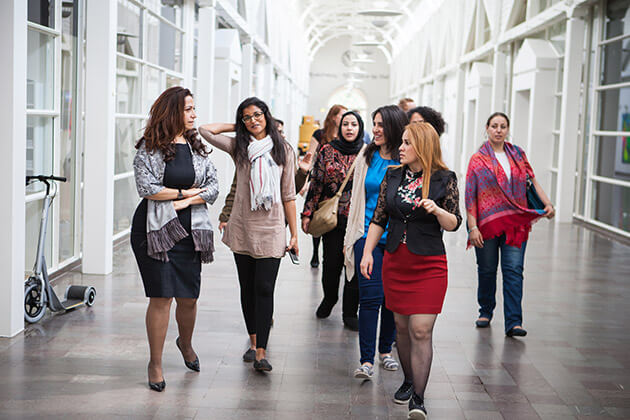
Seven Arab media professionals: Challenging existing perceptions of women in the media. Photo: Rasmus Steen In the spring of 2015, IMS invited seven women media professionals to visit Denmark for a series of public debates and knowledge sharing events on how to challenge male dominance in the media.
“You can choose to portray a woman as a victim, or you can choose to focus on the fact
that she once was a victim, but was able to overcome it. Then she becomes a heroine.
Most media portray Arab women as victims. We want to portray them as heroes,” said senior reporter Nadine Nimri, at a public debate at the Danish Women’s Museum.Nadine Nimri was one of the seven Arab media professionals who visited Denmark as part of this road trip aiming at establishing new networks and relations between media professionals engaged in gender issues in the Arab world and Denmark.
Bono calls for release of human rights defender

Bono calls for release of human rights defenders in Azerbaijan at Montreal concert. Photo: Simon Nicholson With a little help from Bono, the Sport for Rights campaign enjoyed a major victory in June when human rights defender Emin Huseynov was able to leave the country after 11
months of refugee in the Swiss Embassy in Baku to avoid arrest by authorities.The Sport for Rights campaign, which is supported by a coalition of organisations including IMS, worked to draw international attention to the abuse of human rights and imprisonment of journalists in the host country of the European Games, Azerbaijan, taking place between 12 – 28 June 2015.
Syrian Radio Rozana fills information vacuum
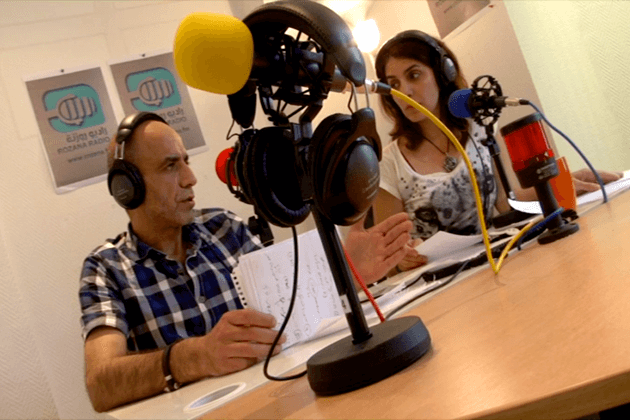
In Radio Rozana’s studio in Paris. Photo: Radio Rozana As the conflict in Syria rages on, the IMS-supported Radio Rozana has against all odds managed to reach out to Syrians with reliable news and information. When the conflict broke out in March 2011, an information vacuum quickly emerged when much of the country’s media was forced to close and journalists had to flee.
Radio Rozana has worked towards filling this gap by providing independent and reliable information in the ongoing conflict. During the first half of 2015, the station experienced
an increase of one million online visitors compared to the same period in 2014.Press clubs in Pakistan unite to respond to threats against journalists

Journalists interview a group of locals protesting over unannounced rolling blackouts in Mohmand Agency. Photo: Wajih Akhtar Six press clubs representing over half of Pakistan’s community of 18,000 journalists agreed in November to work together to establish journalist safety resource hubs at their premises, making this one of the largest projects ever to engage media practitioners in the country.
Pakistan is one of the world’s most dangerous countries for journalists, and the aim of the safety hubs is to improve reporting, documentation and analyses of threats and attacks against journalists and media houses as a means of improving the response and
assistance mechanisms for journalists in distress.10 years of investigative journalism in the Arab world

ARIJ is the region’s leading investigative journalism organisation. Photo: Palinopsiafilms Arab Reporters for Investigative Journalism (ARIJ) could this year celebrate its 10th anniversary as the region’s leading investigative journalism organisation.
Acting as a watchdog of the Arab world, ARIJ has through its more than 350 investigations played a key role in bringing about legislative amendments and prosecutions of wrongdoers.
“Every story we have produced has led to some change. Sometimes it was on the spot and sometimes it took time,” said Executive Director of ARIJ, Rana Sabbagh. “It shows
journalists as well as readers and officials that serious journalism makes authorities think twice.”Read more about the groundbreaking stories from ARIJ
Caravan travels across Burkina Faso to prepare journalists for election coverage
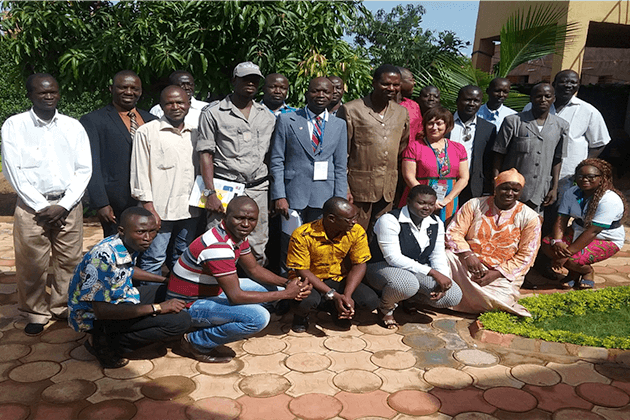
First stop: Koudougou Following the uprising in Burkina Faso in 2014, IMS trained journalists in election reporting and brought together journalists, politicians and civil society to discuss their respective roles during the 2015 elections period.
A media and election caravan travelled to five different cities across the country, securing that local media workers and journalists had a set of guidelines to follow during the elections. Local journalists, political actors and civil society organisations got a better understanding of critical issues such as democracy, elections and the role of the media in the polls.
#MyFreeExpression around the world
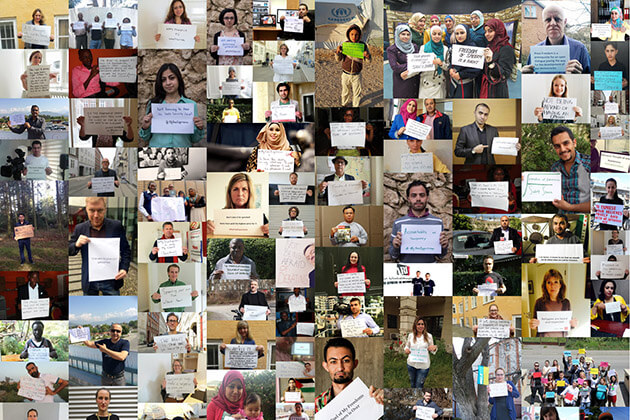
People from all around the world shared with IMS what freedom of expression means to them. Counting down to World Press Freedom Day 3 May 2015, IMS’ #MyFreeExpression
campaign asked people what freedom of expression meant to them. With contributions from journalists and people on the street from most corners of the world, the campaign
put focus on the reality of freedom of expression and how people risk their lives and fear repression and censorship when expressing themselves.In the words of Myanmar’s Aung San Suu Kyi, who was the first contributor to #MyFreeExpression, “it is freedom after expression that is important.”




